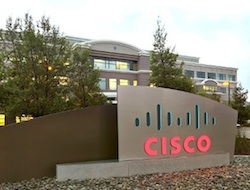Cisco is acquiring LTE femtocell provider Ubiquisys for €242 million in order to strengthen its mobility expertise in delivering intelligent internet networks.
Ubiquisys makes intelligent 3G and LTE small cells technologies that provide seamless connectivity across mobile heterogeneous networks for operators, such as its Smart Cell 3G/4G/Wi-Fi hotspots (read: Ubiquisys and Saguna team up to launch small cell-based caching solution).
The UK-based vendor’s solutions focus on the edge of the network, which should mean its indoor small cells expertise married with Cisco’s existing mobility portfolio and Wi-Fi expertise, will enable the US company to offer a more comprehensive small cells solution that supports operators in their transition to next gen RAN networks.
“Cisco is ‘doubling down’ on its small cell business to accelerate strong momentum and growth in the mobility market,” said Kelly Ahuja, senior vice president and general manager, Cisco Mobility Business Group.
“By acquiring Ubiquisys, we are expanding on our current mobility leadership and our end-to-end product portfolio, which includes integrated, licensed and unlicensed small cell solutions that are tightly coupled with SON, backhaul, and the mobile packet core. For service providers, Ubiquisys supports cost effective coverage and capacity that delivers a differentiated customer experience.”
According to Ovum principal analyst Daryl Schoolar, Cisco gains greatly from Ubiquisys’ small cells experience, given it already works with over 50 vendors and operators including Softbank, SFR and Network Norway, while Cisco only works with AT&T on femtocells.
“The acquisition doesn’t just provide Cisco with Ubiquisys’ small cell knowhow; it also gives Cisco experience in working with a broader set of mobile operators. Ubiquisys provides Cisco much greater market credibility when it comes to 3G and LTE small cells,” he said.
“Cisco will also benefit by having greater control over Ubiquisys’ product development cycle, freeing Cisco from having to rely on the development cycle of third-party partners like IP access.
“Small cell vendors should take Cisco very seriously. Not only is Cisco greatly improving what it can offer mobile operators in terms of a licensed small cell, it can also offer those mobile operators other tools, like data analytics, SON, and evolved packet core needed to build a mobile network. This isn’t something all of Cisco’s competitors can claim.”



